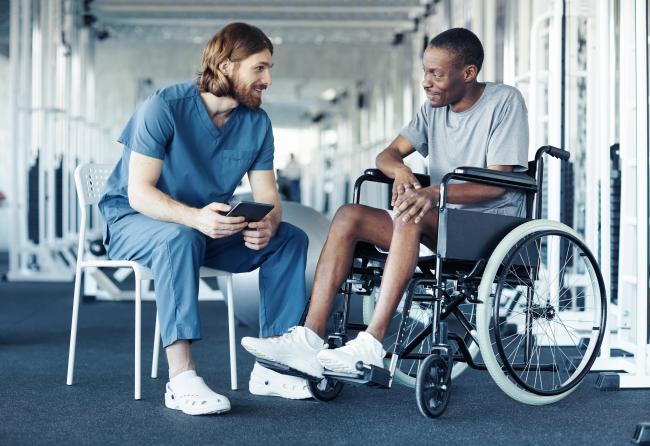
Health & Safety
Emergency Preparedness
As someone with a disability, you may need to take additional steps to prepare for emergencies. Get information and resources that will help you get ready for when disaster strikes and what to do if you need to evacuate or shelter in place.
Ready.gov
Find out what types of disasters could affect your area and sign up to receive alerts and warnings. Learn how to prepare for emergencies by making a plan for your daily needs, creating a support network, and building an emergency kit, and get tips for what your kit should include depending on the type of disability you have.
Create an emergency plan
Know the factors to consider when creating your emergency plan, why you should make a backup plan, and download a free app that helps you track hazards in real time and locate emergency shelters near you.
Coalition on Inclusive Emergency Planning (CIEP)
This statewide disability advisory group works with state and local organizations to create disability inclusion in emergency preparedness, response, and recovery. Get resources on how to prepare for emergencies from FEMA, American Red Cross, CDC, and state agencies.
Healthcare Insurance
Sign up for free or low cost health care coverage and get help with your benefits to access the care you need.
Apple Health (Medicaid)
Learn more about our state’s Medicaid program, Apple Health, which offers free health insurance for people who have blindness or a disability or age 65 or older.
Apple Health for Workers With Disabilities (HWD)
You can work and still receive health care coverage through this state program. Your monthly premium is determined by a sliding scale based on your income and you can save your earnings without disqualifying yourself from other benefit programs.
Statewide Health Insurance Benefits Advisors (SHIBA)
Find free, unbiased, and confidential Medicare counseling in your area. Volunteer advisors can answer your questions and provide information and guidance on Medicare options.
Healthcare Services
Find free low vision eye care near you and learn how to get the most out of your doctor’s visits.
Lion’s Low Vision Clinic
Get assistance in using your remaining vision more efficiently at Washington State School for the Blind’s low vision clinic. This is a secondary care clinic meant to serve patients with low vision including those with multiple disabilities and is not a substitute for primary care from an eye care provider.
Lions Low Vision Clinic at Edith Bishel
This clinic provides comprehensive low vision evaluations for the blind and visually impaired since 1998. Make an appointment for a consultation and evaluation from a local optometrist and receive specific recommendations for visual aids or assistance.
Getting the Care You Need (1.2 MB PDF)
A guide to help you know your health care rights, how to effectively work with your provider to get the care you need, and what to do before, during, and after your appointment.
Information for Caregivers
Caregiving is a demanding job whether you care for a loved one or are employed as a caregiver. Find support, useful information, and resources below.
How to perform common tasks
These short videos provide easy-to-follow, detailed instruction on how to do common tasks if you are blind or visually impaired. Topics covered include buttoning, folding clothes, cooking and food prepping, room familiarization, and white cane techniques.
Caregiver Action Network
This non-profit organization provides education, tools, peer support, and resources free of charge to family caregivers across the country.
Resource list for caregivers of people who are blind or visually impaired
Find instructional videos, advice, support, transportation options, prescription assistance, food assistance, and more.
Aging and Disability Services (ADS)
Get the help you need to care for a loved one while maintaining your quality of life. Services include training, referrals, advice on supplies and equipment, and finding respite care if you need a break from caregiving.
Guidelines for assisting people who are blind and visually impaired
Community Eye Health Journal compiled these practical tips and helpful illustrations on assisting someone who is blind or visually impaired. Learn the etiquette for offering assistance and how to be an effective sighted guide.
Service Animals
Guide dogs and other service animals provide valuable everyday assistance to many people who are blind or have a disability. Learn what is considered a service animal, how to get one, and your animal’s rights in different settings.
Resources for people who use service animals
If you are a guide dog user, connect to resources on advocacy, air travel, disaster assistance, and more.
Beginner’s Guide to Service Dogs
This comprehensive guide explains the steps you need to take to get a service dog.
List of guide dog organizations
Get matched with a custom trained service animal at no cost from one of these non-profits if you are blind or have a disability.
Service and assistance animals rules comparison
Learn the training and certification criteria for service animals under different federal and state laws including the Americans With Disabilities Act, Fair Housing Act, and the Washington White Cane Law.
Guide to Service Animals and the Washington State Law Against Discrimination (386 KB PDF)
A publication from the Washington State Human Rights Commission about the rights of your service animal in public spaces, housing, and at work.
